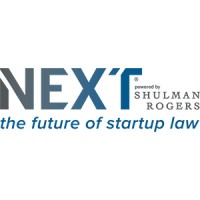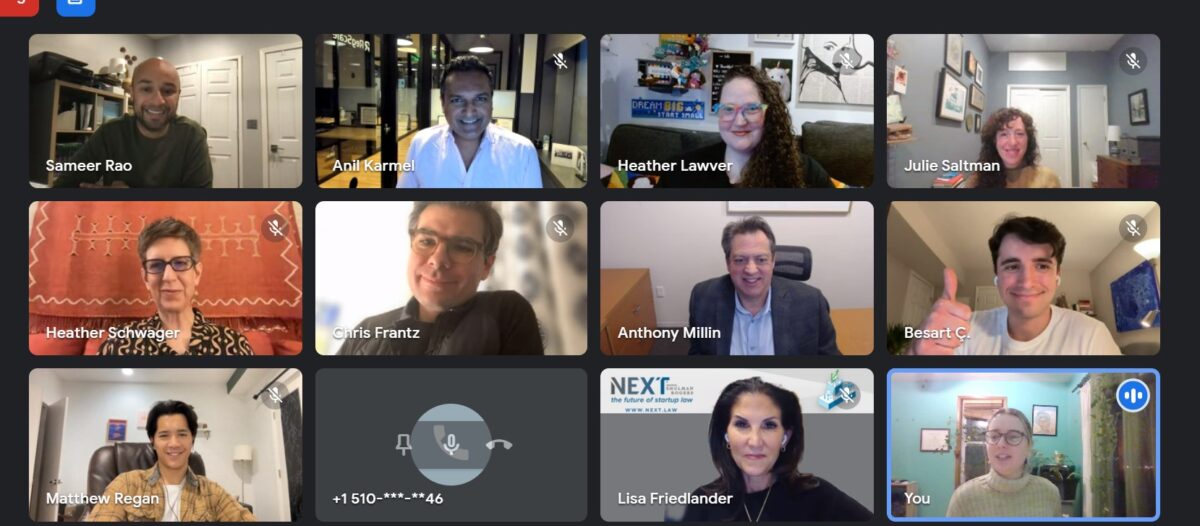How are local startup founders navigating some of the most pressing topics of the day?
Many company leaders spend their days wondering how to best interact with the elements making up DC’s regional tech ecosystem: funders, universities, Big Tech and their peers. All the while, they’re doing everything possible to get their startups off the ground.
At Technical.ly’s latest stakeholder meeting last week, which was hosted in partnership with legal services provider NEXT powered by Shulman Rogers, we sat down with the founders of several 2023 RealLIST Startups to discuss what’s top of mind in the DMV startup scene. Here’s what they had to say about this ecosystem’s assets and setbacks, as well as how they navigate it all.
What’s missing
For Besart Çopa, founder of Georgetown ecommerce startup Chestr, one of the biggest challenges to being a new founder in DC is the local industry’s sheer size. After participating in an accelerator with startups from around the country, he found that other founders have a wealth of events at which to make connections every week — though he noted that they can be as distracting as they are helpful. Even knowing there are local VC firms in DC, he can’t figure out where to find them (you can check out our complete list here).
“It doesn’t feel like the tech community is perhaps as vibrant as our friends in New York or San Francisco for many reasons,” Çopa said.
In contrast, Lisa Friedlander of NEXT felt like the local ecosystem has more to offer than meets the eye.
“There’s so much going on in this ecosystem. I mean, if you’re comparing us to New York or Silicon Valley, then maybe you’ll be disappointed, but more things are coming,” Friedlander said. “There’s something going on, if you wanted to go — if not every night, certainly every week.”
Still, even with room to grow, some pointed out the tremendous progress made in even just the past few years tons of progress, even just in the past few years. Heather Lawver of Perfectly Pitched agreed, noting that the ability to find funding in the area looks totally different from 2014, when she founded her first company.
“I can tell you it is night and day from then to now the amount of support for underrepresented founders in DC,” said Lawver, who identifies as LGBTQ.
The biggest small tech developments
With many local founders developing cutting-edge products, it’s no surprise that AI and new phenomena like ChatGPT are on founders’ brains. But for many, new technologies matter because they can take over mundane tasks. Roselle Safran, the founder of KeyCaliber, said that apps like Gusto and other HR-related technologies have been really helpful to offload tasks.
They’re not always the most fun, they’re not always the craziest tech, but it’s the things that just save you the headaches day to day that honestly are the most exciting for me.Matthew Regan Quindar
“ChatGPT is quite glamorous these days and I know that there are lots of companies that are looking at ways that they can incorporate it or some other type of large language model to ride on the coattails of all the popularity that has right now,” Safran said.
Matthew Regan, the founder of Quindar, said that having tech take on minute day-to-day tasks has really helped him. Right now, he said, Quindar has ChatGPT writing software tests and doing documentation. But even just incorporating apps like Calendly has solved so many problems and freed up more time to focus on his company’s core work.
“They’re not always the most fun, they’re not always the craziest tech, but it’s the things that just save you the headaches day to day that honestly are the most exciting for me,” Regan said.
Lawver is planning to incorporate AI into her marketing and pitch product. But she’s mostly excited not to replace what humans can do, but to make her product more accessible to founders who are still building.
“I’m mostly excited about its potential not to replace human creativity and effort, but to augment it and make it more accessible and cost-effective,” Lawver said.
Local universities
RegScale founder Anil Karmel has so much faith in what local universities can do that he actually built the R&D campus for his company at the University of Tennessee in Knoxville. In his view, universities are the pipeline to building startups; he attributed some of Silicon Valley’s success to its relationship with Stanford University. A good university, he noted, can be a key innovation vehicle to fuel talent into startups.
“Being an innovation vehicle to fuel talent into startups is one of the reasons why I’m personally excited to see Virginia Tech’s Innovation Campus come to life here in Alexandria: to just fuel the DC ecosystem and the next wave of startups, including our own,” Karmel said. “Having close connectivity to universities to fuel talent into startups to help them grow is so, so important.”
Many founders agreed, noting that they had worked in conjunction with local schools and hosted classes and accelerators, even if they didn’t attend university in the area. All in all, they felt like working with local colleges and universities was a great way to support the next generation of founders and expand awareness of entrepreneurial skill sets. Plus, there’s even an ecosystem of universities working together.
“I definitely feel like there’s a lot of momentum behind what’s happening [with universities],” NEXT’s Anthony Millin said. “We’ve also been in meetings where a lot of these universities are connecting with each other and looking, regionally, at what they can do not only within their own programs but across programs.”
That said, as Karmel and BuildWithin founder Ximena Hartsock mentioned, seeking talent with nontraditional backgrounds through programs like apprenticeships is equally important.
We’ve also been in meetings where a lot of these universities are connecting with each other and looking, regionally, at what they can do not only within their own programs but across programsAnthony Millin NEXT powered by Shulman Rogers
A friend in Big Tech
Following last week’s news about a pause on Amazon’s HQ2 construction plans from last week, Big Tech also often sits on founders’ minds. Çopa said that one of the most delightful and surprising things that he’s found in the tech world is how open everyone from the industry, including Big Tech, is to chatting and sharing ideas.
“The beauty of tech is the way that people manifest egos is not by ignoring you or keeping their ways secret,” Çopa said. “But as long as people see that you’re working on something, they have a lot of sympathies.”
Many of the leaders said that they’ve had good experiences reaching out to the world’s largest tech companies. Chris Franz, CEO of Loops, recommended finding someone new at these companies who are eager to prove themselves and want to bring in something that others haven’t heard of — a great opening for startups.
Karmel added that many larger tech companies are very receptive to working with startups. He said that even with all their resources, Big Tech can’t do some things that startups can, which opens plenty of space to work together and add mutual value.
“We just don’t have the sales and marketing dollars that these much larger companies do, so by being able to tell a ‘better together’ story, there’s an opportunity to make a small business much, much bigger,” Karmel said.

This editorial article draws from a virtual session underwritten by NEXT powered by Shulman Rogers, a Technical.ly Ecosystem Builder client. NEXT powered by Shulman Rogers did not review it prior to publication.
Before you go...
Please consider supporting Technical.ly to keep our independent journalism strong. Unlike most business-focused media outlets, we don’t have a paywall. Instead, we count on your personal and organizational support.
Join our growing Slack community
Join 5,000 tech professionals and entrepreneurs in our community Slack today!

The person charged in the UnitedHealthcare CEO shooting had a ton of tech connections

From rejection to innovation: How I built a tool to beat AI hiring algorithms at their own game

Where are the country’s most vibrant tech and startup communities?


